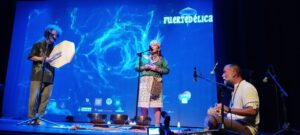One of the main objectives guiding the research at ICEERS is to ensure that everyone has the right to attain optimal physical and mental health. The concern for global mental health has received almost unprecedented attention. It is crucial to move away from reductionist analyses and go deeper into the social, psychosocial, political, economic, and physical factors that influence this sphere. It is also necessary to pinpoint the barriers preventing positive well-being. These factors include violence, social exclusion, isolation, systematic racial and economic inequalities, stigma towards trans or non-binary gender orientation, and vilified behaviours, such as substance use.
In this context, Cannabmed works to reflect invisible and silenced realities that don’t conform to the dominant social, cultural, and political codes. Cannabis is a socially stigmatized substance that standard psychiatry claims causes mental illness. However, this plant has proved to be a highly valuable selfcare tool for many people belonging to vulnerable groups.
Updates on cannabis in Spain
A recent seminar hosted by Cannabmed explored the right of stigmatized groups to attain optimal health with cannabis. The seminar provided a space to hear real-world experiences on cannabis via a holistic quality of life perspective.One important element to how cannabis can be made accessible is through policy change. At the seminar, Òscar Parés, ICEERS’ Deputy Director, gave an overview of the current political and social context for cannabis in Spain. He mentioned the three proposals from the Congress of Deputies on cannabis regulation in Spain. The first by Más País did not come to a vote and that from ERC (Esquerra Republicana de Catalunya) won’t be presented. Only the proposal from Podemos is pending. Parés reported that the government does not want to address this issue until the subcommittee on therapeutic cannabis is complete.
Cannabmed participated in Spannabis, the largest cannabis event in Europe, and at the International Cannabis Business Conference. Cannabmed is currently organizing the Global Marijuana March, as well as an online congress to gather evidence-based perspectives to educate political parties. Another notable event will be the presentation of the book Luz verde a la libertad (The Green Light of Freedom) by Albert Tió, president of the Federation of Self-Regulated Cannabis Associations of Catalonia (FEDCAC). Tío has been in prison for a year and a half for running a Cannabis Social Club in Barcelona.
Parés also mentioned the #cannabisLEGAL campaign that has been promoted by nine organizations across Spain. The movement works to put pressure on Congress by giving a voice to people and groups working to shift paradigms on cannabis regulation.
Finally, Parés promised to “not to let politicians rest without making regulations that respect our rights.” He referenced Malta’s model and the desire to serve as a bridge towards similar regulations in Spain.
Mental health and human rights
The first of the seminar speakers was Dr. José Carlos Bouso, ICEERS’ Scientific Director, who contextualised the organization’s work in relation to mental health. The statistics for depression and anxiety have doubled in Spain. Bouso noted that mental health is not a mere biochemical process and needs a broader perspective based on human rights. In addition, there are a number of mental health determinants that have an impact: violence, disempowerment, inequalities, harmful situations, the persecution of stigmatized behaviour, and more. The increasing use of anxiolytics and antidepressants has become a new epidemic. There is currently a three month wait to access public psychological care in Spain. Dr. Bouso discussed how there currently seems to be a lack of psychologists, psychiatrists, and medications.
Alongside the mental health determinants, there are hurdles to overcome. For example, mental health is understood as a biochemical deficit. It is perceived as something that happens to an individual and is measured in economic terms. It is based on morbidity and focuses on the individual developing these problems. However societal factors of the pandemic, such as lock downs and social isolation, also have a major impact.
Spain has one of the highest rankings in the European Union for life expectancy and quality of life. The research shows a 20-point difference between high and low levels of education. It also considers economic factors. One in four people in Spain live at the poverty line. Three out of ten people with low income have mental health problems. In addition, suicide rates are the highest in history.
Sedative medications (benzodiazepines) are the third most commonly consumed drug in Spain. And since prescription drug use is the third leading cause of death in the world (one third is due to psychiatric medications), their effectiveness is increasingly questionable. Dr. Bouso mentioned that these medications are no more effective than placebo and people taking antidepressants are fifteen times more likely to commit suicide. He noted that these medications are prescribed broadly for indications such as chronic pain, drug abuse, eating disorders, anxiety, obesity, and others.
The population is being increasingly medicalized. Loneliness has a powerful impact and has reached the level of a global pandemic according to the WHO. Paradoxically, the ten happiest countries in the world have the highest suicide rates and consume the most antidepressants and sleep aids. Instead of mental health being understood as an internal conflict of the mind, Dr. Bouso recalled that the politics of division are driving people crazy. “The political discourse of hostility creates alienation and depression in the population,” he said.
Dr. Bouso commented that there should be more emphasis put on education and core values, instead of allowing biomedicine to take over. He noted that only five percent of the budget is allocated to public health or prevention. “Beyond medicalised practice, we need to create a new framework to reconstruct narratives,” he added. Dr. Bouso stressed the concept of self-management, which goes beyond self-care, and involves the whole community. He noted the United Nations is considering getting rid of the biomedical model, and is instead working towards an intersectional approach to consider economic, political, cultural, and social factors.
Structural violence
Anthropologist Aura Roig, director of Metzineres, presented on her organization’s work to support women and nonbinary people with substance use challenges. These groups face multiple barriers in access to quality healthcare. Due to navigating masculine-dominated spaces, they often feel lonely and live with a lot of guilt. They use cannabis mainly to reduce their consumption of substances such as crack, methamphetamine, or heroin.
Metzineres brings a more holistic and individualised perspective to harm reduction. They look at the different factors and conditions these groups face and create flexible approaches to adapt to their needs. Women can visit Metzineres and have their basic needs covered without prior screening. They have access to beds, food, nurses, lawyers, and companionship. They are also able to attend theatre events, photography and dance workshops, and more. Metzineres also organizes multiple community activities, such as neighbourhood meetings and weekly paellas in Barcelona’s El Raval neighborhood in order to help break stigma. It is an innovative and cutting-edge model that creates community strategies and social solidarity in a privileged region such as Catalonia.
Metzineres advocates for unconditional love and radical tenderness without judgement. They create collective resilience based on mutual support and courage. The organization is committed to an anti-prohibitionist approach that centers on transdisciplinary education and passion for transformation. Those who come to Metzineres develop compassionate ways to adapt to complex realities.
Metzineres receives between 30 and 40 visitors a day, 42% of whom live on the street. Fourty-six percent of them have a mental health diagnosis and 33% are involved in survival sex work. All of the visitors have endured violence as children and as adults. They have faced not only physical violence, but also institutional or structural violence. For example, these groups often have not had access to housing or health care because of drug use. They have been criminalized or given higher sentences and harsher living conditions in prison.
Among these groups, polysubstance use is common, including smoked cocaine, tobacco, cannabis, alcohol, injected heroin, etc. Metzineres teaches them ways to practice harm reduction without judging their consumption. The organization will soon be offering brochures on cannabis to provide useful advice to be incorporated into people’s daily lives.
Cannabis in prison
The final presenter was Raúl Jiménez, a social educator on drug dependency at the Centre for Care and Monitoring (CAS) in at Brian’s Prison in Catalunya. He reported on a study carried out in collaboration with ICEERS on the uses of cannabis in prison. The Health Agents Project began in 2007 and played a decisive role in this study. It consisted of a voluntary and confidential four-month training program. The work was carried out horizontally. Researchers deconstructed the role of educator and made participants the facilitators. The experiences and knowledge of the inmates then created different processes. The goal is to promote good health in prison that builds democratic, respectful, and trusting relationships. The group works as a unit which gives them a sense of well-being and belonging.
According to Jiménez, “Societies operating in groups tend to be in better health. When people come together, they won’t need to go to the doctor as much.” He also noted that being able to participate directly in decision making improves the health of the prison population. That is why Brian’s Prison program is committed to group dynamics, cultural events, sports, and clubs.
However, cannabis is only one of the topics being explored by Jiménez’s team at CAS. They also focus on issues around family, sexuality, and sexual consent. The cannabis project was started through a healthcare worker initiative who created a questionnaire to interview the inmates. This gave prison residents the opportunity to actively participate in scientific research.
The questionnaire assessed the interviewees’ health status, quality of life, social support, perspectives on life in prison, and cannabis use. Of the 63 respondents, the majority were male hashish users who had been in prison for an average of five years. More than 50% had drug problems. They smoked about three joints a day on average and the general age to first use cannabis was 14 years. One of the most interesting findings was that the only factor that served as a predictor of health was that of social support. The survey results showed that cannabis helped reduce the stress of being in prison and improved their quality of life. This resulted in a decrease of the use of other drugs and medications.
Involving stigmatized populations in research
During the question period, Dr. Bouso pointed out that cultures have always been the object, but never the subject, of research. Research doesn’t consider the needs of stigmatized groups, which is why it is essential to start methodological processes that directly involve them. Aura Roig, from Metzineres, felt that “a cannabis club should be available in prisons, to provide access to the same health standards as the outside world.” One of Raúl Jiménez’s colleagues mentioned that rolling papers continue to appear in Catalan prisons despite being prohibited. Inmates sometimes use pens or bottles to consume cannabis.
Miriam Imbernón, another researcher involved in the prison study, brought up that the results have received wide media coverage. This media publicity made it so that more people heard about and were moved by the story. Dr. Bouso added, “Being in the media is not innocuous. It is always a bombshell, like throwing a hand grenade into the center of power.”
Roig brought up that Metzineres was started amidst a controversy over the erroneously named “narcoflats” (consumption flats) that actually serve a social function. Many of the people are working as staff in the consumption flats or are involved in retail sales there. This is why community-based programs are so important. Metzineres does outreach at these locations and offers harm reduction strategies, such as Naloxone, and providing new supplies (such as tinfoil, or clean needles). “At the end of the day, we are seeing a lot of trauma,” Roig added, recalling that 80-90% are victims of failed drug policies.
Dr. Bouso had a pessimistic perspective about regulation, which he believes will be be limited. “The medicalization paradigm is engulfing everything. There are only two ways, medicalization and punishment,” he said.
On the topic of encouraging the scientific community to further include women and people who are non-binary, Aura denounced the standard extractive, non-reciprocal research approaches. She instead proposed grassroots research where women participate in the design as expert witnesses and as a direct way of gathering evidence as opposed to just providing testimonies.
Finally, Dr. Mery Peña, Vice-president of the Clinical Society of Endocannabinology, pointed out, “Resilience can only be collective.” She brought up the importance of the entourage effect of cannabis as “a concept that should be more fully applied to our social dynamics.”
The schedule for upcoming seminars can be found by visiting the Campus Cannabmed website.



